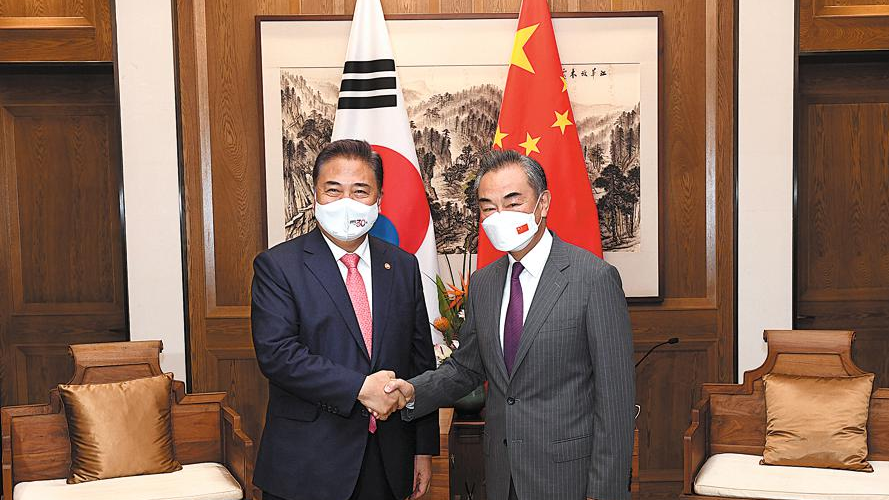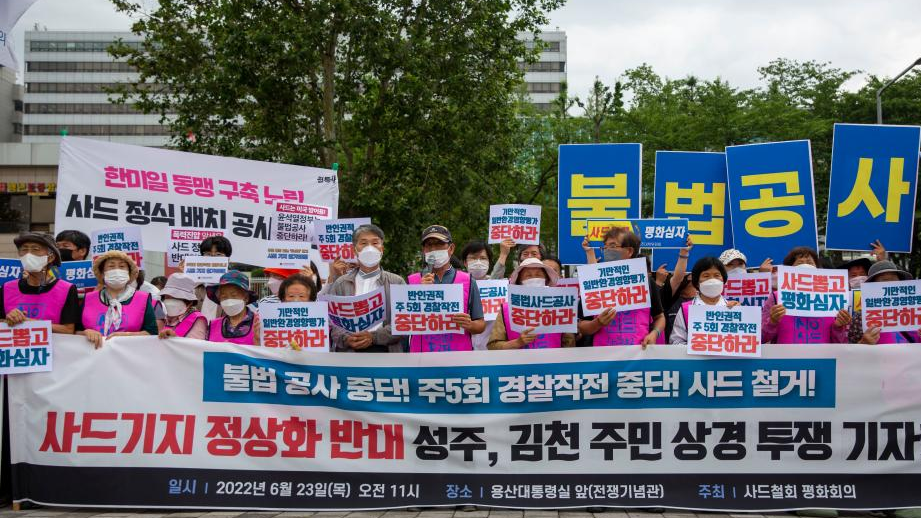
Chinese State Councilor and Foreign Minister Wang Yi (R) meets with Park Jin, Foreign Minister of the Republic of Korea (ROK), in Qingdao, East China's Shandong province, August 9, 2022. /Xinhua
Chinese State Councilor and Foreign Minister Wang Yi (R) meets with Park Jin, Foreign Minister of the Republic of Korea (ROK), in Qingdao, East China's Shandong province, August 9, 2022. /Xinhua
Editor's note: Hannan Hussain is a foreign affairs commentator and author. He is a Fulbright recipient at the University of Maryland and a former assistant researcher at the Islamabad Policy Research Institute. The article reflects the author's opinions and not necessarily the views of CGTN.
In his first visit to China since taking office, Foreign Minister Park Jin of the Republic of Korea (ROK) engaged with his Chinese counterpart Wang Yi on a range of constructive issues to jointly elevate bilateral and regional interests. A welcome understanding on upholding supply chain stability, managing security risks around the Korean Peninsula, and prioritizing independent ties, are all a step in the right direction ahead of their 30th anniversary of relations. "As the two neighboring countries, the right way to get along with each other lies in maintaining continuity and consistency of policies," said Chinese State Councilor and Foreign Minister Wang Yi.
For starters, a joint agreement to prioritize China-ROK dialogue on industrial and supply chain stability offers important pushback against the politicization of global value chains. It is particularly important considering the attempts by Washington to put together a so-called alliance on the chip-making front, contesting the culture of resilient supply chain partnerships among Asian countries.
For Seoul and Beijing to take bilateral initiative and ensure "complete, safe, smooth, open and inclusive" industrial and supply chains, is a reminder that they are well-positioned to coordinate future strengths and rise above any closed loop of chip production, such as the one sought by the U.S. with ROK, Japan and China's Taiwan region, in a bid to undercut China.
Park's landmark visit arrives ahead of the 30th anniversary of the establishment of China-ROK diplomatic relations, one that Park signaled was an opportunity to "carry out open and inclusive cooperation on the basis of the China-ROK strategic cooperative partnership."
Given the symbolism, it is critically relevant for both sides to demonstrate "independence and self-reliance" in the face of growing economic coercion. The significance of it shows in the very fact that Seoul has been facing sustained pressure from Washington to prioritize the latter's preferences. After all, the U.S. has been eager to advance nuclear and military technologies in a sensitive regional corridor, and is keen to get ROK's subscription to a divisive, U.S.-backed semiconductor alliance – "Chip 4" – with an eye on China. All that reinforces the need for both sides to keep their long-term interests front and center in high-level diplomatic engagement.

South Korean residents and peace activists who protest against the deployment of the U.S. Terminal High Altitude Area Defense (THAAD) rally near the presidential office in Yongsan district in Seoul, South Korea, June 23, 2022. /Xinhua
South Korean residents and peace activists who protest against the deployment of the U.S. Terminal High Altitude Area Defense (THAAD) rally near the presidential office in Yongsan district in Seoul, South Korea, June 23, 2022. /Xinhua
On regional security issues, constructive deliberations on the Terminal High Altitude Area Defense system (THAAD) – a U.S.-deployed advanced missile defense system in the ROK – are key to prioritizing each other's security concerns in equal measure. There is strong merit to Beijing's studied concerns about THAAD, and the risks it poses to major strategic security interests of value to both countries. It is for these reasons that Wang and Park's high-level exchange on the matter deserves further continuity, as both nations continue to prioritize dialogue over escalation in major regions, chiefly the Korean Peninsula.
On the economic and trade front, China continues to serve as South Korea's top export destination and enjoys the status of its largest trading partner. For the first six months this year, collective imports and exports have struck $184 billion, an estimated 10 percent increase from the same period in 2021. Such robust momentum makes it a valuable consideration for both sides to jointly advance the second phase of negotiations for the China-South Korea Free Trade Agreement (FTA)." The [Seoul] government will continue to strengthen economic cooperation with China," stated Park.
Understand that over the course of China-ROK trade growth, support for development between both sides has in turn yielded important benefits for time-tested economic partners. Pushing forward negotiations for the second phase of their FTA is thus warranted given their open support for key multilateral trading arrangements in the region, including the Regional Comprehensive Economic Partnership (RCEP). Moreover, considerable success in constraining the COVID-19 pandemic provides due cause for Seoul and Beijing to step-up trade activity, inject confidence in regional recoveries, and advance each other's pivot towards stronger growth momentum.
Ultimately, demonstrated common-ground on managing regional security risks, securing supply chains and propelling future trade end up illuminating the reality that ROK and China are as suited to self-reliance as they are to strengthening the global free trade system.
(If you want to contribute and have specific expertise, please contact us at opinions@cgtn.com. Follow @thouse_opinions on Twitter to discover the latest commentaries in the CGTN Opinion Section.)

